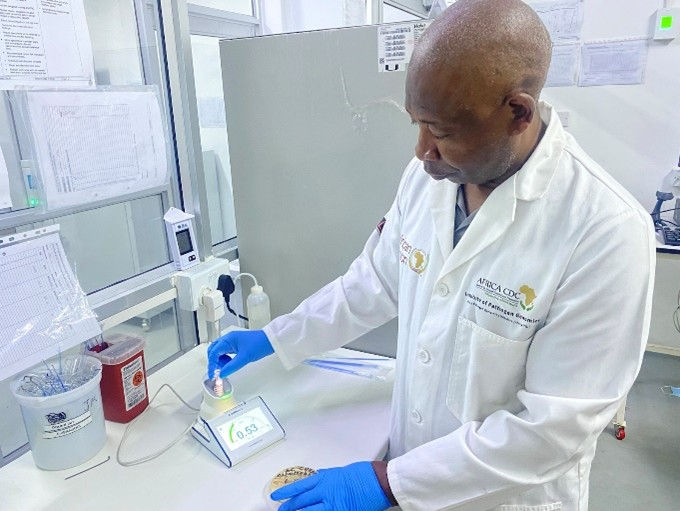JIDCuk-funded student Hlanai Gumbo reflects on the first year of his PhD project, at the University of Zimbabwe and Sally Mugabe and Parirenyatwa Hospitals in Zimbabwe
- Hlanai Gumbo
- Nov 19, 2025
- 4 min read
Hlanai Gumbo is a dedicated Medical Laboratory Scientist based at the National Microbiology Reference Laboratory (NMRL) in Harare, Zimbabwe. Hlanai shares his background and explains more about his PhD research:
“With a background in diagnostics and research, I am committed to addressing current challenges in Microbiology, such as HIV and emerging infectious diseases, through continuous professional development and translational research.
My experience in genomic sequencing and bioinformatics stems from important collaborations. Dr. Tapfumanei Mashe's previous work with The Quadram Institute (QIB) on Salmonella Typhi sequencing connected me with Prof. John Wain and the JIDCuk Charitable Trust. As a Scientist at the NMRL, I am a key member of the team that collaborated with QIB in the early establishment of the SARS-CoV-2 Nanopore and Illumina Genomic Sequencing Laboratory at NMRL. This facility has been integral to national efforts in COVID-19 testing and surveillance.

Professional Development and Research Focus
I have a background in research and diagnostics anchored by specialized training, including a SARS-CoV-2 PCR training with Africa CDC-ASLM. I further deepened my expertise by completing a fellowship focused on genomic sequencing and bioinformatics at the University of Stellenbosch (2019) and receiving Bioinformatics training on outbreak detection and disease surveillance at the University of Western Cape (2023). My interest lies particularly in translational research that effectively uses genomic sequencing and bioinformatics for infectious disease surveillance, outbreak tracking, and the development of diagnostics and vaccines.
I have served as a Senior Medical Laboratory Scientist at NMRL since November 2014. Since then, I have been actively involved in the national HIV viral load testing rollout and am now at the forefront of establishing an HIV drug resistance testing and sequencing facility. Prior to my work at NMRL, I conducted laboratory tests for research at the Zvitambo Institute for Maternal & Child Health Research.

Academic Background and DPhil Research
I hold an MSc in Biomedical Science from the University of Ulster, UK (2013), and a Higher National Diploma in Applied Biological Technology from Harare Polytechnic College. My commitment to advancing scientific knowledge is reflected in collaborative publications in peer-reviewed journals covering topics such as congenital infections, SARS-CoV-2 mutations, and viral load testing optimization.
The JIDCuk Charitable Trust currently supports my DPhil studies at the University of Zimbabwe, where my research focuses on Quorum Sensing (QS) in multi-drug-resistant Acinetobacter baumannii. My primary goal is to understand the mechanisms of hospital-acquired infections (HAIs) associated with A. baumannii. Addressing this research gap in nosocomial infections, especially in Zimbabwe, is a critical step towards developing laboratory interventions to prevent these infections, ultimately saving lives and reducing hospitalization costs.


Acinetobacter baumannii is a significant nosocomial pathogen that poses a critical public health threat due to its intrinsic and acquired multidrug resistance (MDR). Quorum sensing (QS) is a cell-to-cell communication system employed by many bacterial species, which plays a pivotal role in regulating biofilm formation and virulence. This majorly contributes to the bacterium’s persistence and resistance - in the environment, hospitals and host infection.
My PhD research project aims to investigate the prevalence, QS mechanisms, and potential therapeutic interventions against MDR A. baumannii in Zimbabwean hospitals.
My main goals are to investigate the prevalence of hospital-acquired A. baumannii from infected patients and within the nosocomial environment of the Sally Mugabe Hospital and the Parirenyatwa hospital in Zimbabwe, as well as characterize the epidemiology and genomic mechanisms of resistance of these isolates. I will then evaluate the potential feasibility of using paracetamol, piroxicam and ketoprofen in combination with colistin or imipenem to inhibit QS and increase antibiotic efficacy in the local clinical isolates of A. baumannii.
This study will provide the first baseline data on the prevalence and molecular characteristics of MDR A. baumannii in Zimbabwe, addressing a significant knowledge gap. The evaluation of paracetamol, piroxicam and ketoprofen as potential QS inhibitors could lead to novel therapeutic strategies used locally in Zimbabwe and could be applied to other countries.
Genomic analysis of the newly isolated strains will elucidate resistance mechanisms and inform antimicrobial stewardship. This research aligns with Zimbabwe's National Action Plan on AMR and emphasizes the importance of locally relevant data to combat the global threat of antimicrobial resistance.
My findings will therefore contribute to evidence-based policy development and potentially pave the way for innovative treatment approaches. This work will also eventually be published in peer-reviewed journals and will contribute to a broader knowledge of A. baumannii.
I am grateful for the support from JIDCuk who provided funding for my registration fees, tuition fees, and stipend. My research also received funding for reagents for laboratory testing, sequencing, and bioinformatics training for data analysis from JIDCuk. I have successfully completed my probation, I am now in my second year, and I look forward to the success of the research.”





Comments